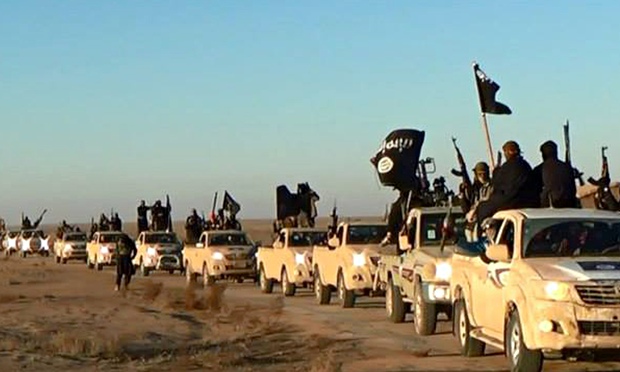ISIS’s “Cleansing” of the Middle East
April 30, 2015
A new Islamic terror group has quickly made its name well-known throughout the world, ISIS (Islamic State of Iraq and Levant). This infamous militia of marauders force the people they hold dominion over to follow their strict Sunni code or are forced from the land or are brutally murdered.
ISIS was a bi-product of US intervention in Iraq, which lead to a growth of numerous other extremist groups. ISIS’s goal is to set up a Sunni/Islamic state in Syria and Iraq, where the literal translation of the Koran must be followed. Residents of the Islamic state, who do not follow the Islam, mostly Christians, will be forced to pay a costly tax, as instructed by the Koran, or suffer execution. They also seek to eliminate Shiite Islam from the region, as they view it as a tainted form of Islam. More often than not, non Sunni residents in ISIS-controlled territories are faced with brutal aggression–while countless men, women, and children are being killed, many through decapitation.
In the past several years, the Western World and especially Israel have had belligerent attitudes toward countries such as Iran and Syria, which are confronting ISIS and trying maintain stability in the Middle East. These middle eastern countries should be given western aid or at the very least should not be opposed, if the ISIS situation is to be resolved. The West, Iran, and Syria should see ISIS as a common enemy that should be combated through a combined effort, rather than being used as a force to topple each others’ nations.
Unfortunately, America has previously, in 2013, armed ISIS and other extremist groups with high grade weapons and had given them training, in order to use them to dismantle Assad’s rule in Syria and put pressure on Iran. Their volatile experiment had inevitably gotten out of hand, which tends to be a common result of attempting to control extremism, and has declared the West an enemy of their form of Islam.
In more recent times, ISIS has been receiving its weapons and ammunition from Sunni Arab countries, primarily Saudi Arabia. Many of the countries sending ISIS fighters supplies are receiving economic aid, weapons, and ammunition from the United States.
The Free Syrian Army, the main anti-Assad rebel group, is still being directly supported by the US government, yet this should not continue. Along with the rebels having questionable intentions, such as being linked with numerous terror groups including ISIS, there is no reasonable justification for removing Assad from power. The only reason that President Obama can give to justify the removal of Assad is an alleged usage of chemical weapons, which has not been proven, and Assad has been cooperative with the US in handing over any stockpiled chemical weapons that he has. Furthermore, unlike many other Middle Eastern countries, Syria is a secular nation, meaning that it has separation of the church and the state, much like America’s system. This means that minority religious groups are protected by the government and that women are not forced to abide by any Islamic dress code and are allowed to work and live independently. The rebels, however, have been reported by Syrian refugees to force the women to wear hijabs and full body robes, and if they do not abide, they are not allowed to be in the public.
The Lebanese, anti-Zionist militia, Hezbollah, meaning the Party of God in Arabic, has aided Assad’s regime in Syria, having recaptured several territories from the rebels. Hezbollah refers to the ISIS soldiers as Takfiri, which are Sunni Muslims that can only see two sides to the world (black and white) and seek to destroy anything that does not follow the complete, literal translation of the Koran.
Israel has reportedly provided medical treatment to the Syrian rebels’ leader. After receiving medical treatment, the rebels were rearmed with weapons and ammunition. Many of the treated rebels are know to have strong ties to both Al Qaeda and ISIS. Since Al Qaeda and ISIS never attack Israel or Israeli citizens and Israel gives their soldiers medical treatments, some theorize that the two terrorist groups may be part of a Zionist conspiracy to keep the Muslims at war with one another and to become the dominant force in the region , but as of now, there is limited evidence to prove such a claim.
The United States should not continue to support revolutions in the Middle East and North Africa (the Muslim world), as the end result is typically a failed state where religious minority groups, especially Christians, become oppressed. During 2011, in the North African nation of Libya, the United States began a NATO intervention, in order to overthrow the Libyan, authoritarian leader, Muammar Gaddafi. The NATO operation was successful, but the end result of the nation was an even more oppressive country. The rebels who took over the nation established a strict Sunni Islamic rule, forcing all members of the country to identify as Sunni Muslims. Christianity, although it had restrictions placed upon it, was protected under Gaddafi’s rule and is now not banned with the exception of a few churches only for migrant workers.
Although authoritarian leaders such as Gaddafi are without question not ideal, it is at times necessary to to have a strict leader to maintain order in such a volatile place, which some areas of the Middle East are. If Assad, in Syria, is to fall, the nation will more than likely suffer the same fate as Iraq and Libya and become what Rand Paul refers to as a “extremist wonderland.” If the US government, the Arab nations, and the rest of the West support “peace in the Middle East,” then cutting any aid to the Syrian rebels would be an excellent start.
It is believed that these revolutions are being supported to maintain the US dollar as the reserve currency in the region, as Syria has stopped using the USD as their reserve currency. Likewise, Gaddafi proposed to use a new, Libyan currency in 2010, and he was killed about a year after. This may explain why the US recently has shown belligerent attitudes towards Russia, since they helped set up the BRICS reserve currency, in attempt to replace the dollar as the global reserve currency.
In ISIS’s attempt to “cleanse” the world from all things that do not have to do with Sunni Islam, the terror group has now turned to destroying the past in the name of their prophet. ISIS has sought out to destroy all christian and ancient pagan structures in their occupied territories, as they are all viewed as a corruption to Islam, even the Muslim buildings.
ISIS demolished the Tomb of Jonah, in Iraq, which holds significance in Christianity, Islam, and Judaism. The Tomb was said to be the final resting place of Jonah, who was a protagonist in a biblical tale where he learns to appreciate God’s mercy and also to not place material objects above people.
In northern Iraq, ISIS raided the Mosul Museum destroying many ancient Assyrian artifacts, dating back thousands of years. Luckily, many of the artifacts were replicas, for many of the real ones were being transported to Baghdad, prior to the raid, in fear of such an event occurring. However, a number of the artifacts were indeed authentic, making their destruction a loss that can never truly be recovered from.
In Syria, ISIS managed to demolish the Armenian Genocide Museum and the Apostolic Church connected to it. The two structures were made in remembrance of the 1.5 million Armenians slaughtered by Turks in 1915.
Although not directly related to ISIS, the Syrian Civil War has caused countless other historical sites to be destroyed in the conflict, many of which dating hundreds to thousands of years old. This degree of destruction to cultural sites recently in Syria is only comparable to the American invasion of Iraq, but the majority of destruction being caused now is done so deliberately.






